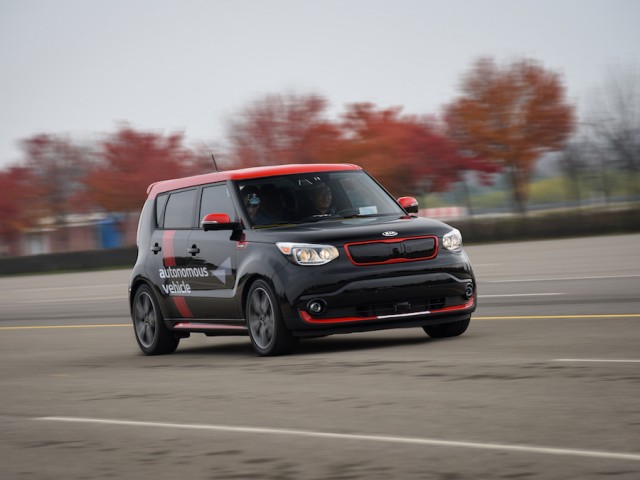What's the news?
We've got news that Kia is trying to cut its fleet-wide emissions by 25 per cent for 2020 - well, it has also announced that it is working on part-autonomous driving technologies for its range by the same year, with a fully autonomous car on the market by 2030... if Skynet hasn't wiped us all out first.
At a cost of $2 billion (€1.86bn) of initial investment, Kia will work on its Advanced Driver Assistance System (ADAS) technologies, employing extra engineers in the process. The research is focusing on three areas: Recognition, with sensors to detect other vehicles and hazards, as well as poor driving conditions and the road ahead; Judgment, with software designed to let the car make decisions based on data gathered by the ADAS sensors; and Control, electronic and mechanical features to let the car's brain, well... control the vehicle based on its decisions.
That means by 2020, Kia owners will enjoy a number of semi-autonomous bits of kit. First is Highway Driving Assist (HDA), which uses lane guidance and advanced smart cruise control to maintain its distance and position on a motorway with little input from the driver; it'll even stick to varying speed limits and assist in safe overtakes as well. Linked to that is Traffic Jam Assist (TJA), in which the car takes over the tiresome stop-start driving duties in moderate to heavily congested traffic, keeping a safe distance to the car in front.
Meanwhile, for city driving, there's a 'smart' parking assist system, which can slot the car into parallel or perpendicular spaces automatically, as well as Remote Advanced Parking Assist System (RAPAS) - allowing the car to be parked with no one inside, using a smart key within a certain range of the vehicle. For those of us who perhaps aren't as enamoured with the idea of self-thinking cars, any ADAS software can be bypassed by driver control.
However, such technofear objections won't stop Kia bringing a fully automated car to market by 2030. It will utilise vehicle-to-vehicle (V2V), vehicle-to-infrastructure (V2I) and vehicle-to-everything (V2X) communication to ensure the car can communicate directly and independently with its surroundings.
Anything else?
Tae-Won Lim, vice president of the Central Advanced Research and Engineering Institute of Hyundai Motor Group, said: "Fully-autonomous vehicles are still some way off, and a great deal of research and rigorous product testing will need to be carried out to make the 'self-driving car' a reality. Kia is still in the early stages of developing its own technologies, and we are confident that the latest innovations - both partially and fully autonomous - will ultimately make driving safer for everyone."

